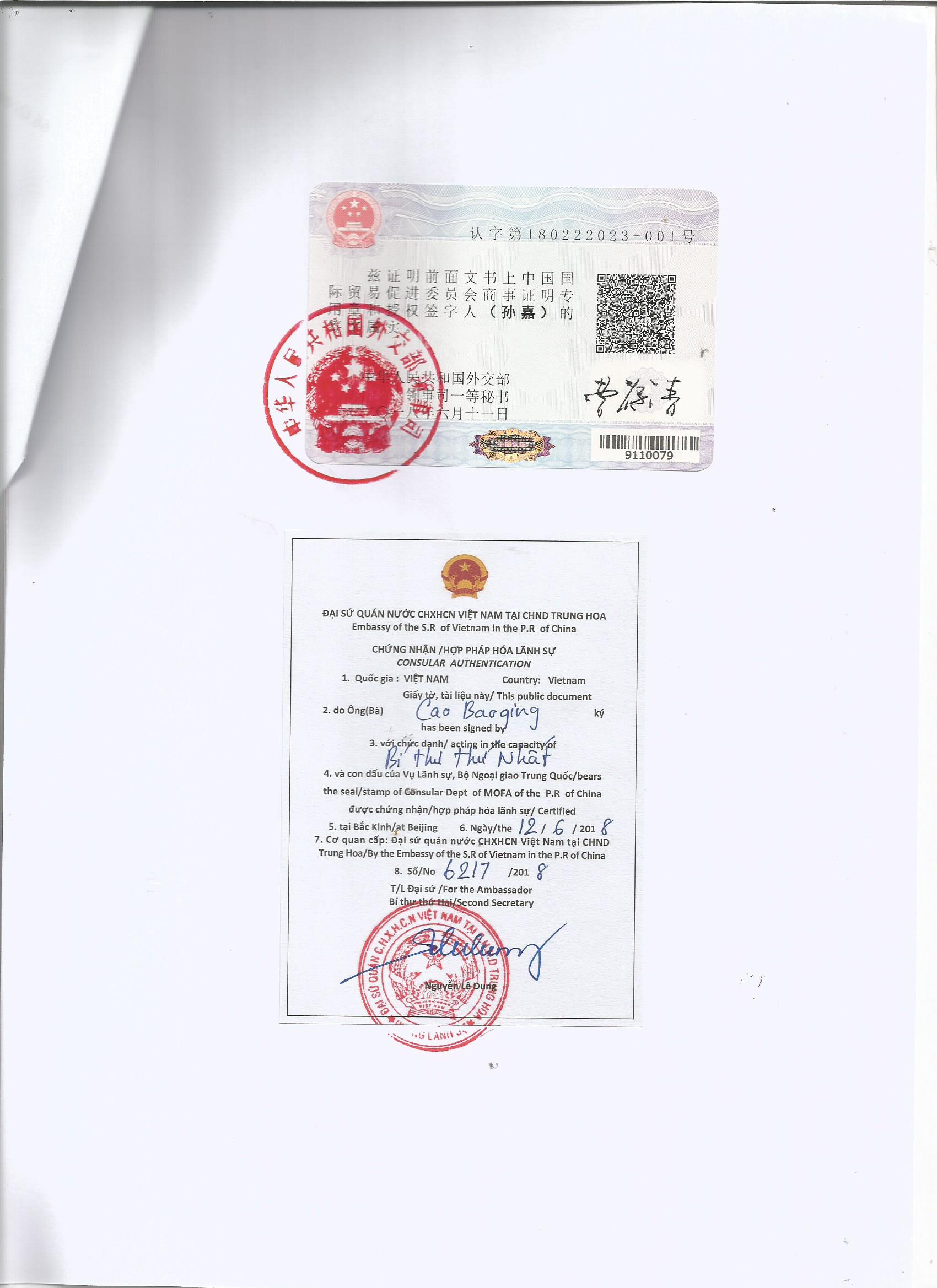越南大使馆认证+领事馆认证+贸促会认证+CE盖章
CE只需要认证副本就可以了
 对准备出国的中国公民有哪些建议?
对准备出国的中国公民有哪些建议?
答:外交部领事司对准备出国的中国公民有以下建议:
(一)了解目的地国。尽可能收集目的地国的风土人情、气候情况、治安状况、艾滋病、流行病疫情、法律法规等信息,并采取相关预防措施。
(二),查询中国各驻外使领馆的联系方式以及相关旅行提醒、警告等海外安全信息。若目的地国与我国无外交关系,则可了解其周边国家的中国使领馆的地址与电话,以便就近求助。
(三)检查护照有效期(剩余有效期一般应在一年以上),以免因护照有效期不足影响申请签证,或因在国外期间护照过期影响行程。
(四)办妥目的地国签证。确保自己已取得目的地国的入境签证和经停国家的过境签证,签证种类与出国目的相符,签证的有效期和停留期与出行计划一致。但需要注意的是,根据国际惯例,即使已取得一国签证,该国也有权拒绝当事人入境而无需说明理由。
(五)核对机(车、船)票。仔细核对票面上所显示的登机(车、船)时间、地点以及联程票的前后衔接是否正确。
(六)购买必要的人身安全和医疗保险等方面保险。国外陌生环境存在一些安全隐患,而国外医药等费用普遍较高,建议选择合适险种,以防万一。
(七)进行必要的预防接种,并随身携带接种证明(俗称“黄皮书”)。有条件的话,最好做一次全面体检。
(八)严禁携带毒品、国际禁运物品、受保护动植物制品及前往国禁止携带的其他物品等出入境。
(九)慎重选择携带个人药品。许多国家对药品入境有严格规定,为减少不必要的麻烦,出国前应了解有关国家的海关规定,在允许的范围内选择所携药品品种和数量。如因治疗自身疾病必须携带某些药品时,应请医生开具处方,并备齐药品的外文说明和购药发票。
(十)注意目的地国海关在食品、动植物制品、外汇等方面的入境限制。如携带大额现金,必须按规定向海关申报。切勿为陌生人携带行李或物品。
(十一)与家人和朋友保持联系。出国前应给家人或朋友留下一份出行计划日程,约定好联络方式。建议在护照上详细写明家人或朋友的地址、电话号码,以备紧急情况下有关部门能够及时与他们取得联系。护照、签证、身份证应复印,一份留在家中,一份随身携带,还要准备几张护照相片,以备不时之需。
What advice do you have for Chinese citizens preparing to go abroad?
A: The Consular Department of the Foreign Ministry has the following Suggestions for Chinese citizens going abroad:
(1) Know the country of destination. Collect as much information as possible about the local conditions and customs, climate, public security, AIDS, epidemic diseases, laws and regulations of the destination country, and take relevant preventive measures.
(2) Check the contact information of Chinese embassies and consulates abroad as well as relevant travel reminders, warnings and other overseas security information. If the destination country has no diplomatic relations with China, you can get the addresses and telephone Numbers of the Chinese embassies and consulates in neighboring countries, so as to get help nearby.
(3) To check the validity of the passport (the remaining validity period should be more than one year in general), so as not to affect the application for visa due to the insufficient validity of the passport, or to affect the itinerary due to the expiration of the passport while abroad.
(4) The visa for the country of destination shall be completed. Make sure that you have obtained an entry visa for the destination country and a transit visa for the stopover country. The type of visa is consistent with the purpose of going abroad, and the validity and duration of the visa are consistent with the travel plan. However, it should be noted that, according to international practice, even if a country has obtained a visa, that country has the right to refuse the person's entry without giving reasons.
(5) Check machine (car, boat) tickets. Carefully check the boarding (bus, boat) time, place and connecting ticket on the ticket surface to see if they are correct.
(6) to purchase necessary personal safety insurance and medical insurance. Foreign strange environment exists some safety hidden danger, and foreign medicine and other costs are generally higher, it is recommended to choose the right kind of risk, just in case.
(7) To carry out necessary inoculation and carry along with them the certificate of inoculation (commonly known as "Yellow Book"). If possible, you'd better have a thorough physical examination.
(8) Strictly prohibit the entry and exit of drugs, internationally prohibited articles, protected animal and plant products and other articles prohibited by the sending countries.
(9) Choose carefully to carry personal medicines. Many countries have strict regulations on the entry of medicines. In order to reduce unnecessary troubles, we should know the customs regulations of relevant countries before going abroad and select the type and quantity of medicines to be carried within the allowed scope. If it is necessary to carry certain medicines for the treatment of your own disease, you should ask your doctor for a prescription, and prepare the instructions in foreign language and the invoice for the purchase of medicines.
(10) Pay attention to the entry restrictions imposed by the customs of the destination country on food, animal and plant products, foreign exchange, etc. If you carry large amounts of cash, you must declare it to the Customs in accordance with regulations. Never carry luggage or belongings for strangers.
Keep in touch with family and friends. Before going abroad, you should leave a travel schedule for your family or friends and agree on good contact information. It is suggested that the addresses and telephone Numbers of family or friends should be written in detail on the passport, so that the relevant authorities can contact them timely in case of emergency. Your passport, visa, and ID card should be photocopied. Leave one at home, one with you, and prepare several passport photos for emergencies.


